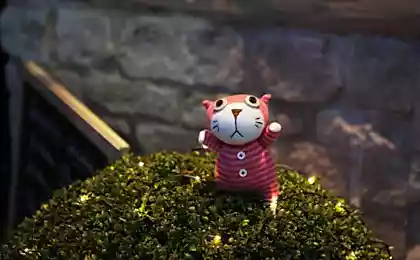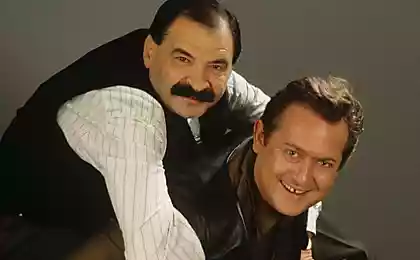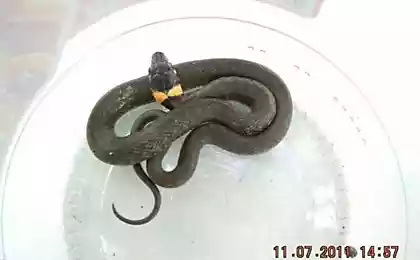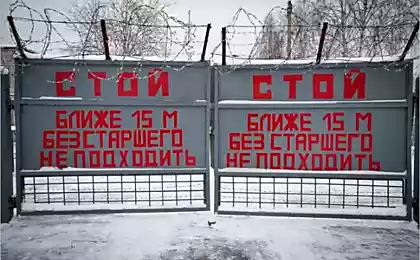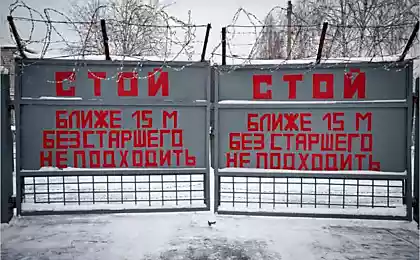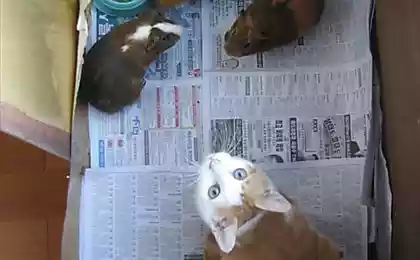824
Pichalka, vkusnuypirogek, ovulyashka and other "mimimi"
Pichalka, vkusnuypirogek, ovulyashka why Russians like so mimimishnaya vocabulary
In modern Russia, taxis "mimishny" Newspeak: the word "pichalka" tell all, young and old, boys and girls post in the "Instagram", "sweets", the ladies in the state call themselves "beremenyashkami." Mimishnaya (or nyashnye) vocabulary indicates the infantilization of society, but most likely, it numbered watches.
In the first year of journalism St. Petersburg State University Russian language teacher taught us, 17-year-olds: If possible, avoid in speech and writing diminutive suffixes. Is bad, it is not comme il faut. "Chicken," "papa", "table" - all these "buzzwords" -deminutivy you do not paint. These buzzwords - uneducated aunts. Then the teacher told us the etymology of the mat Thus we learned that the word of the letter "x" - root word "needles».
"Mimishnaya" vocabulary, which has been actively consumed a few years ago, obviously stems from the desire of citizens to use his speech deminutivy (diminutive form of words). Together with abundant "lion" in social networks Language "mimishnost" - evidence that Russia is a whole generation, and even more, "Peter penov": adult children, infantile.
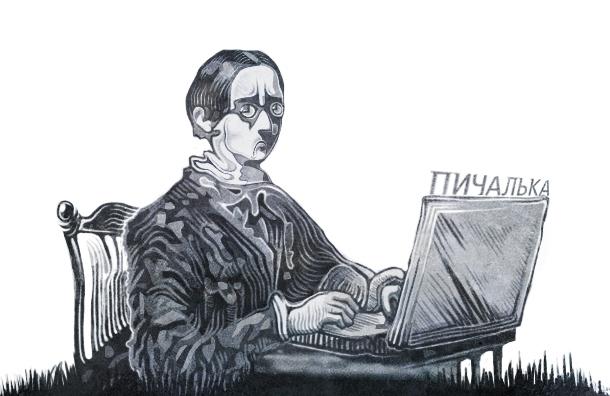
Even for the same swear words this generation there were "mimishnye" euphemisms. "Kick-Ass, as there closely," - says a glamorous blonde, squeezing his chest in rhinestones from Swarovski through the crowd. Blonde stretches vowels mannered - almost like Alia "Kick" from the series "Univer" (now a State Duma deputy Kozhevnikova), which count and legitimized this beautiful word repeatedly used it in prime time tv screen.
The very interjection "mimimi" came to us from the cartoon "Madagascar" (2005). Furry animal, a reptile that has successfully implemented an interjection in the minds of Russians, and the former "Musi-Pusi" was forgotten.
Where have gone the "pichalka" - is not clear. One of my friends even three years ago - when there was a registration of national top-level domain for Russia - took his sacramental "pichalka.rf" (though still on the site is nothing but fotochki mimishnoy dogs and more than a thousand "likes"). While the popularity of "pichalka" is gaining momentum: Now this word is found in the social network "VKontakte", on average, once every few minutes.
It is interesting that the description of the Siberian river pechalka possible to meet the writer, philologist Leo Assumption - in his book "The word of the words", which was released back in 1970. "Like you, I was touched, it was - says the Assumption. - But it was enough emotion to me (...) literally minutes. Almost immediately, I looked at the other tributaries of the basin (the river in Western Siberia - "MP") and gasped ... Here's the rather short list: pechalka, KARALKA, Silke, PYULKA, talc, CHOSALKA (and Lake CHOSAL) VATYLKA, cooking Sil -KY, pokolku, OLYAGAY-normed ". "Ka" in all river place names - the old Selkup "Que" river.
River pechalka hardly has any relevance to the modern "pichalka." According to one version, the word invented vanilki - suborder hipsters cultivating romance and depression, as well as the sweet tooth. However, according to "Wikipedia", subculture emerged in the 2010s. If you read the archives of different blogs - it becomes clear that many LJ-users began to use the word themselves, sincerely convinced that took him out of my head. As the English say, great minds think alike. Or "fools thought converge" - as they say Russian.
On the one hand, a female discourse: women love all the "ocharovashka", "obayashki", "sweeties". On the other hand, is a vernacular, typical of the poorly educated urban residents. In the same series: "two piece of sausage", "hlebushek", "egg».
But the origin of the word "nyashny" is so annoying professional linguists, we know: it is the Japanese "meow" ("AE"). Means the definition of the Internet encyclopedia "lurkmore", "a feeling of tenderness, joy and emotion." Popularized the interjection and nasochinyali away derivatives buzzwords ("nyasha", "nyashny") anime fans. It is interesting that, according to the dictionary Dahl "nyasha" - a "dirt from tinoyu, liquid, swampy lake bottom; viscous liquid swamp. " That is something categorically "kawaii».
Members "VKontakte" tell whether they like mimimishnaya vocabulary.
Eugene: "I hate any diminutive word. Instead Kaptsov and piptsa prefer a traditional three-storey ».
Radif: "For me, every new word - is good. That is the fact of the appearance of these words makes me happy, but the words themselves as something not very much like ».
Tanya: "Do not use under any circumstances, because it sucks».
Hope: "Disgusting! Right I cringe when I hear it. I am for the classic literary Russian language ».
Alex: "sweets", "Smack" - annoying. "Kick-Ass", "kapets" - can be used when the mother before the man uncomfortable in his convictions, but he either would not mind, either replace the mat at the same euphemisms. Most traditionally silent or speak. But "pichalka" amuses me, and I take it, of course, it always means a share of irony ».
Alexander: "Mat use - rude and do not hesitate: the construction without this in any way. Euphemisms try not to use it. Only if the phrase had slipped out and mate in this context is extremely undesirable. Among euphemisms are quite funny. The director of my school 14 years ago, looking at the results of the preliminary examination in mathematics, loudly and clearly said, "Stabilizets guys." Diminutive word allowed to use when they create a grotesque. "An hour ago, on the ground near the crane outrigger left shoe. Stove fell, almost on tap ... Xia. In general, pichalka Pal Valerich ».
Opinion
Doctor of Philology, professor of Russian language RSPU. Herzen Valeriy Efremov:
Origin "mimimishnyh" words - are genetically different. On the one hand, the same "pichalka" or "not nravitstsa" in Zemfira - this seems to echo "padonkovskogo" language media that entertain that distort the image of the spelling. But now the language well rested in the Bose. "Nyashnye" as well as "mimimishny" - that is connected with the culture of anime and in a broader sense - the influence of Japanese culture in which the word "kawaii" plays a very important function. They kawaii can be anything: from the exterior to the Prime Minister.
"Snacks" - a word associated with deminutivami. It is known that the use of deminutivov characteristic of the two categories of a native speaker. On the one hand, a female discourse: women love all the "ocharovashka", "obayashki", "sweeties". On the other hand, is a vernacular, typical of the poorly educated urban residents. In the same series: "two piece of sausage", "hlebushek", "egg».
It turns out that the seemingly similar things together as an idea about a new language, but in fact it's all different phenomena. Here it is necessary to carry and "Mama" language "ovulyashki", "beremenyashki." This is another plane. Who uses the word "nyashny", "mimishny"? Most likely, the girl 19-20 years old, which is not yet thinking about "ovulyashkah" and other "beremenyashkah." The latter - in the speech of women who are concerned about reproductive functions.
All of this together gives a sense of growing a new language, which, in my opinion, did not present any coherent construct a picture consisting of different puzzles.
From my point of view and as a speaker and as a philologist, it all tastes the language below. However, it may be affected by my gender sexism: I like a man to use all these "mimimishki", "pichalka" ... I somehow live on TV asked: "Can you say" mimimishka? "" I realized that I can not.
If we talk about the causes of widespread "mimishnogo language", one of the most important - is the language of protest. People are tired of what they hear in the media, particularly in the pro-government - kondovy, uninteresting language. On the other hand, there is the level of the channel TNT and the project «House-2».
The second point. Why is the word "kawaii" is important for Western culture? Let us remember the "Tattoo" and why they have found a response in Japan: adult aunt, who behave like girls - and this is what is good "lies" on Japanese culture. Which for a European it looks quite infantile. It turns out that another reason for the appearance of such a language - it is a common infantilization of society. If a person works from morning to night and occupied by some production problems in his language, he should not be such, he was not to "mimimi».
The third reason - it is a form of escapism, escape from reality. We are accustomed to thinking of escapism on the one hand, leaving the computer reality, on the other hand - this is role playing. When I see uncles adults under 40, who pose as hobbits, I think that for them it is - the reluctance to live in the real world. And here, perhaps, we have an example of a language that allows you to create a kind of a niche in which a person comfortable.
But the list of "mimishnyh" token is not great. Is not there in front of us of a certain variant Ellochka-ogress, which was enough 30 words? There is nothing fundamentally new in this language is not. Yes, there are new tokens, but it's words- "butterfly" phony. I am sure that "mimimishny" language goes as fast as the "padonkovsky».
via ljfun
Source:
In modern Russia, taxis "mimishny" Newspeak: the word "pichalka" tell all, young and old, boys and girls post in the "Instagram", "sweets", the ladies in the state call themselves "beremenyashkami." Mimishnaya (or nyashnye) vocabulary indicates the infantilization of society, but most likely, it numbered watches.
In the first year of journalism St. Petersburg State University Russian language teacher taught us, 17-year-olds: If possible, avoid in speech and writing diminutive suffixes. Is bad, it is not comme il faut. "Chicken," "papa", "table" - all these "buzzwords" -deminutivy you do not paint. These buzzwords - uneducated aunts. Then the teacher told us the etymology of the mat Thus we learned that the word of the letter "x" - root word "needles».
"Mimishnaya" vocabulary, which has been actively consumed a few years ago, obviously stems from the desire of citizens to use his speech deminutivy (diminutive form of words). Together with abundant "lion" in social networks Language "mimishnost" - evidence that Russia is a whole generation, and even more, "Peter penov": adult children, infantile.

Even for the same swear words this generation there were "mimishnye" euphemisms. "Kick-Ass, as there closely," - says a glamorous blonde, squeezing his chest in rhinestones from Swarovski through the crowd. Blonde stretches vowels mannered - almost like Alia "Kick" from the series "Univer" (now a State Duma deputy Kozhevnikova), which count and legitimized this beautiful word repeatedly used it in prime time tv screen.
The very interjection "mimimi" came to us from the cartoon "Madagascar" (2005). Furry animal, a reptile that has successfully implemented an interjection in the minds of Russians, and the former "Musi-Pusi" was forgotten.
Where have gone the "pichalka" - is not clear. One of my friends even three years ago - when there was a registration of national top-level domain for Russia - took his sacramental "pichalka.rf" (though still on the site is nothing but fotochki mimishnoy dogs and more than a thousand "likes"). While the popularity of "pichalka" is gaining momentum: Now this word is found in the social network "VKontakte", on average, once every few minutes.
It is interesting that the description of the Siberian river pechalka possible to meet the writer, philologist Leo Assumption - in his book "The word of the words", which was released back in 1970. "Like you, I was touched, it was - says the Assumption. - But it was enough emotion to me (...) literally minutes. Almost immediately, I looked at the other tributaries of the basin (the river in Western Siberia - "MP") and gasped ... Here's the rather short list: pechalka, KARALKA, Silke, PYULKA, talc, CHOSALKA (and Lake CHOSAL) VATYLKA, cooking Sil -KY, pokolku, OLYAGAY-normed ". "Ka" in all river place names - the old Selkup "Que" river.
River pechalka hardly has any relevance to the modern "pichalka." According to one version, the word invented vanilki - suborder hipsters cultivating romance and depression, as well as the sweet tooth. However, according to "Wikipedia", subculture emerged in the 2010s. If you read the archives of different blogs - it becomes clear that many LJ-users began to use the word themselves, sincerely convinced that took him out of my head. As the English say, great minds think alike. Or "fools thought converge" - as they say Russian.
On the one hand, a female discourse: women love all the "ocharovashka", "obayashki", "sweeties". On the other hand, is a vernacular, typical of the poorly educated urban residents. In the same series: "two piece of sausage", "hlebushek", "egg».
But the origin of the word "nyashny" is so annoying professional linguists, we know: it is the Japanese "meow" ("AE"). Means the definition of the Internet encyclopedia "lurkmore", "a feeling of tenderness, joy and emotion." Popularized the interjection and nasochinyali away derivatives buzzwords ("nyasha", "nyashny") anime fans. It is interesting that, according to the dictionary Dahl "nyasha" - a "dirt from tinoyu, liquid, swampy lake bottom; viscous liquid swamp. " That is something categorically "kawaii».
Members "VKontakte" tell whether they like mimimishnaya vocabulary.
Eugene: "I hate any diminutive word. Instead Kaptsov and piptsa prefer a traditional three-storey ».
Radif: "For me, every new word - is good. That is the fact of the appearance of these words makes me happy, but the words themselves as something not very much like ».
Tanya: "Do not use under any circumstances, because it sucks».
Hope: "Disgusting! Right I cringe when I hear it. I am for the classic literary Russian language ».
Alex: "sweets", "Smack" - annoying. "Kick-Ass", "kapets" - can be used when the mother before the man uncomfortable in his convictions, but he either would not mind, either replace the mat at the same euphemisms. Most traditionally silent or speak. But "pichalka" amuses me, and I take it, of course, it always means a share of irony ».
Alexander: "Mat use - rude and do not hesitate: the construction without this in any way. Euphemisms try not to use it. Only if the phrase had slipped out and mate in this context is extremely undesirable. Among euphemisms are quite funny. The director of my school 14 years ago, looking at the results of the preliminary examination in mathematics, loudly and clearly said, "Stabilizets guys." Diminutive word allowed to use when they create a grotesque. "An hour ago, on the ground near the crane outrigger left shoe. Stove fell, almost on tap ... Xia. In general, pichalka Pal Valerich ».
Opinion
Doctor of Philology, professor of Russian language RSPU. Herzen Valeriy Efremov:
Origin "mimimishnyh" words - are genetically different. On the one hand, the same "pichalka" or "not nravitstsa" in Zemfira - this seems to echo "padonkovskogo" language media that entertain that distort the image of the spelling. But now the language well rested in the Bose. "Nyashnye" as well as "mimimishny" - that is connected with the culture of anime and in a broader sense - the influence of Japanese culture in which the word "kawaii" plays a very important function. They kawaii can be anything: from the exterior to the Prime Minister.
"Snacks" - a word associated with deminutivami. It is known that the use of deminutivov characteristic of the two categories of a native speaker. On the one hand, a female discourse: women love all the "ocharovashka", "obayashki", "sweeties". On the other hand, is a vernacular, typical of the poorly educated urban residents. In the same series: "two piece of sausage", "hlebushek", "egg».
It turns out that the seemingly similar things together as an idea about a new language, but in fact it's all different phenomena. Here it is necessary to carry and "Mama" language "ovulyashki", "beremenyashki." This is another plane. Who uses the word "nyashny", "mimishny"? Most likely, the girl 19-20 years old, which is not yet thinking about "ovulyashkah" and other "beremenyashkah." The latter - in the speech of women who are concerned about reproductive functions.
All of this together gives a sense of growing a new language, which, in my opinion, did not present any coherent construct a picture consisting of different puzzles.
From my point of view and as a speaker and as a philologist, it all tastes the language below. However, it may be affected by my gender sexism: I like a man to use all these "mimimishki", "pichalka" ... I somehow live on TV asked: "Can you say" mimimishka? "" I realized that I can not.
If we talk about the causes of widespread "mimishnogo language", one of the most important - is the language of protest. People are tired of what they hear in the media, particularly in the pro-government - kondovy, uninteresting language. On the other hand, there is the level of the channel TNT and the project «House-2».
The second point. Why is the word "kawaii" is important for Western culture? Let us remember the "Tattoo" and why they have found a response in Japan: adult aunt, who behave like girls - and this is what is good "lies" on Japanese culture. Which for a European it looks quite infantile. It turns out that another reason for the appearance of such a language - it is a common infantilization of society. If a person works from morning to night and occupied by some production problems in his language, he should not be such, he was not to "mimimi».
The third reason - it is a form of escapism, escape from reality. We are accustomed to thinking of escapism on the one hand, leaving the computer reality, on the other hand - this is role playing. When I see uncles adults under 40, who pose as hobbits, I think that for them it is - the reluctance to live in the real world. And here, perhaps, we have an example of a language that allows you to create a kind of a niche in which a person comfortable.
But the list of "mimishnyh" token is not great. Is not there in front of us of a certain variant Ellochka-ogress, which was enough 30 words? There is nothing fundamentally new in this language is not. Yes, there are new tokens, but it's words- "butterfly" phony. I am sure that "mimimishny" language goes as fast as the "padonkovsky».
via ljfun
Source:

